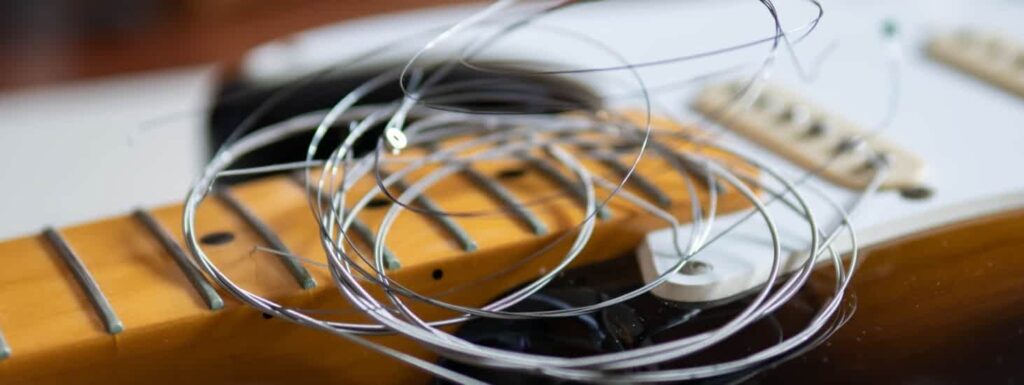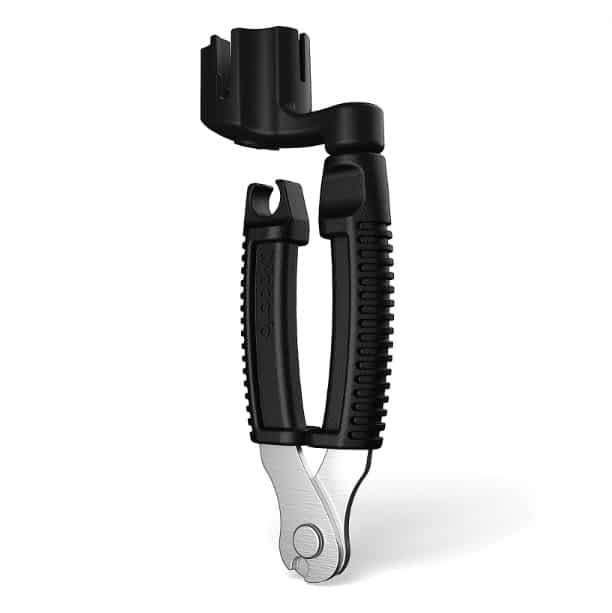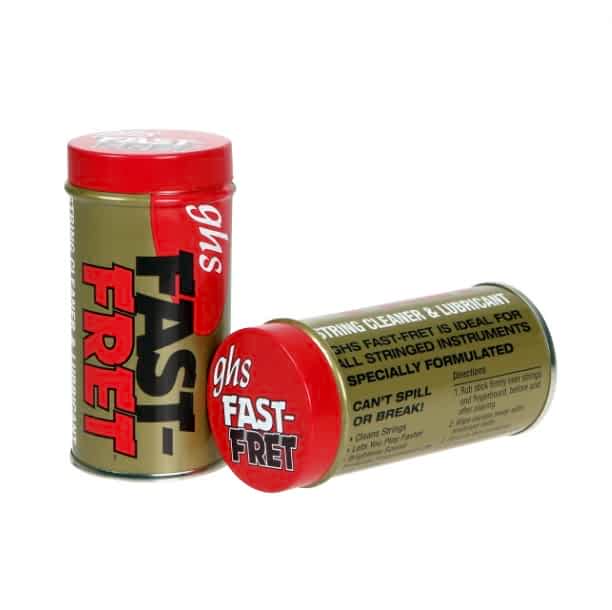Best
Guitar String or Winder
-
Overall: Versatile tool suitable for guitars, banjos, and mandolins
-
Best Feature: High-quality string winder with built-in clipper, bridge pin puller and string stretcher.
-
TedScore™: 8/10
Best
String Cleaner
Fast Fret
-
Overall: Enhances playing speed and dexterity
-
Best Feature: Lint-free cloth for efficient string cleaning
-
TedScore™: 8/10
Best
Guitar Maintenance Kit
-
Overall: High-quality components ensure durability and longevity.
-
Best Feature: Gig light for easy setup in dark environments
-
TedScore™: 9/10
Ever wondered about the right time to swap out guitar strings? This mystery fascinates many guitar enthusiasts. Experienced players often suggest changing them every 3 months or after 100 hours of playtime. While these numbers provide a general guideline, habits and playing style heavily influence this decision. Many factors come into play, like climate. Humidity and temperature shifts can weaken strings faster than a bargain ice cream melting on a summer’s day. Old strings can dull your sound and make those tunes as flat as pancakes. For the best sound, consider how often you strum those strings. They’ll thank you with clear, crisp notes. Whether you’re a budding guitarist or a seasoned pro, tuning in to your guitar’s strings can be like having secret music magic. Discover how string changes can keep your guitar sounding like new every time. Dive into the world of guitar care and unleash your music mojo!
As a fellow guitarist, I know the struggle of deciding when it’s time for new strings.
Whether you play only occasionally or daily, changing your strings can have a huge impact on your music’s sound and feel. The frequency of changing your strings depends on how often you play and your musical style.
Are you ready to explore the perfect schedule for changing your guitar strings? Let’s make your guitar sound its best!
Why is It Important to Change Guitar Strings Regularly?
Before we dive into the specifics of how often to change guitar strings, it’s important to understand why this task is so essential in the first place.
Regularly changing your strings will not only keep your instrument sounding great, but it will also help you maintain its overall health.

The string on a guitar can wear out over time as they are constantly being plucked and strummed, so replacing them not only keeps their sound vibrant but also prevents damage from the build-up of dust or dirt causing corrosion.
Replacing your strings regularly helps ensure that they are kept in tune for extended periods.
What Affects the Life of a Guitar Strings
A guitar string’s life depends on many factors, including the type of strings used, how often they are played, and the environment in which it’s kept.
Frequency of Use
The amount of time you play your guitar will affect the life of its strings. If you play daily, you must replace your strings more often than someone who only plays occasionally.
Regular use causes the strings to wear out faster because when you pluck and strum them, they move back and forth against the frets and bridge, creating tiny grooves in the material. This wear and tear will eventually lead to dead strings that sound dull and lifeless.The Environment in Which You Play
Another factor that affects the life of your guitar strings is the environment in which you play. Living in a humid climate or having heavy smoke or dust particles in the air can cause corrosion and rust on your strings over time.
This will affect the sound of your strings and your instrument's overall appearance and playability.Type of Guitar String Used
Playing Style
Guitar String Quality
The better the quality, the longer they will remain in tune and resist corrosion.
Higher-end strings are often made with a combination of materials such as steel or bronze, which tend to last much longer than those made from nylon or other synthetic materials.Where Guitar is Stored
It’s important to keep your guitar in a safe, dry environment, as this can affect the life of the strings.
If the instrument is exposed to extreme temperatures or humid weather conditions, it can cause the strings to corrode and break more quickly.3 Signs Which Means It's Time to Change Guitar Strings
One of the guitarists’ most crucial maintenance tasks is regularly changing their strings.
Not only does this help keep your instrument in top shape and sounding great, but it also helps extend its lifespan by preventing corrosion or damage from the build-up of dust or dirt.
But how do you know when to change your guitar strings?
If your guitar strings are old and worn out, they may produce a dull or muted sound. This is because dirt, sweat, and oil from your fingers can build up on the strings over time, reducing their clarity and brightness.
As strings become worn out, they tend to lose their elasticity, making it challenging to keep in tune. If your strings are slipping out of tune more often than usual, this could be a sign that it’s time for new strings.
When you inspect the strings on your guitar, look for any visible signs of wear or corrosion. These can include discoloured spots, rust, fraying, or even bare metal where the coating has worn off. If you notice any of these signs on your strings, this indicates it’s time for a replacement.

How Often Should You Change Your Guitar Strings?
Acoustic Guitar
Regarding acoustic guitars, the strings should be changed roughly every 2-3 months. This is because the phosphor bronze or 80/20 bronze strings used on acoustic guitars are more susceptible to wear and tear due to their softer core.
Coated acoustic strings may last longer, but changing them at least every 6-9 months is still recommended.

PERFECT FOR: Players of All Levels
FEATURES: Hexagonally shaped high carbon steel core for precise intonation
OTHER INFO: Gauge: .012, .016, .024, .032, .042, .053
D'Addario EJ16 Phosphor Bronze
When you check the price above, you’ll see there are loads of great places to buy this item. Our personal favorite is Gear4music.
It is the largest music retailer in the UK and fast becoming the most respected online music shop in the US too. Their customer service is excellent, they have competitive prices, really fast shipping, and usually have the longest guarantee.
Most professional musicians use Gear4music, so there is no reason why you shouldn’t too!
- Comfortable playing experience
- Rich and balanced sound
- Dazzling tonal versatility for various styles
- Long-lasting strings with excellent intonation
- Environmentally friendly and corrosion-resistant packaging
- None
The professional musician who wrote this article combined many things,
from the product build, manufacturer’s reputation through to feedback
from other users, to create our famous TedScore™.
Classical Guitar
Since classical guitars use nylon strings, they are more sensitive to wear and tear. Therefore, regularly checking them for any signs of damage, such as fraying, corrosion, or discolouration, is essential.
It’s recommended to replace guitar strings every 4-6 weeks if you play them daily for 1-2 hours or longer. If you don’t play as often, strings should still be changed every 1-3 months, depending on how much use they get.

PERFECT FOR: All level
FEATURES: .028 .029 .032 .035 .040 .043
OTHER INFO: Silver ball ends for easy string installation and tuning stability
Fender 130 Classical Nylon Clear, Strings
When you check the price above, you’ll see there are loads of great places to buy this item. Our personal favorite is Gear4music.
It is the largest music retailer in the UK and fast becoming the most respected online music shop in the US too. Their customer service is excellent, they have competitive prices, really fast shipping, and usually have the longest guarantee.
Most professional musicians use Gear4music, so there is no reason why you shouldn’t too!
- Enhanced projection and clarity in the sound.
- Longer string life, allowing for less frequent change-outs.
- A unique manufacturing process ensures long-lasting durability.
- Easier installation
- None
The professional musician who wrote this article combined many things,
from the product build, manufacturer’s reputation through to feedback
from other users, to create our famous TedScore™.
Electric Guitar
Electric guitar strings are primarily made of nickel-plated steel, which gives them durability against temperature and humidity changes. However, they are still susceptible to wear and degradation over time.
Continuous use and contact with the oils from your fingers and exposure to air and varying temperatures can cause the strings to corrode.
On average, electric guitar strings tend to last around 2-3 months. However, proper care can extend their lifespan to around 6 months.

PERFECT FOR: All Guitarists
FEATURES: Plain Steel: .010, .013, .017
OTHER INFO: Nickel Wound: .026, .036, .046
D'Addario EXL110 Electric Guitar Strings
When you check the price above, you’ll see there are loads of great places to buy this item. Our personal favorite is Gear4music.
It is the largest music retailer in the UK and fast becoming the most respected online music shop in the US too. Their customer service is excellent, they have competitive prices, really fast shipping, and usually have the longest guarantee.
Most professional musicians use Gear4music, so there is no reason why you shouldn’t too!
- Easy to fret and bend strings
- Excels in all styles of playing - from jazz to rock
- Provides a warm yet bright sound that stands out on stage
- Can be used for recording or live shows quietly without extra noise
- Some players may prefer a different gauge for specific playing preferences
The professional musician who wrote this article combined many things,
from the product build, manufacturer’s reputation through to feedback
from other users, to create our famous TedScore™.
Bass Guitar
If you’re playing regularly, the strings should be changed for bass guitars every 6 to 8 weeks.
However, touring bassists often change strings every 3rd or 4th show to avoid string breaks. If you play less often than this, it’s recommended that you change your strings every six months to ensure they don’t become over-tensioned.

PERFECT FOR: Beginners
FEATURES: Nickel wound strings for high-end tone at a great price point.
OTHER INFO: String gauge 040-95
Bass Guitar String Set by Gear4music
When you check the price above, you’ll see there are loads of great places to buy this item. Our personal favorite is Gear4music.
It is the largest music retailer in the UK and fast becoming the most respected online music shop in the US too. Their customer service is excellent, they have competitive prices, really fast shipping, and usually have the longest guarantee.
Most professional musicians use Gear4music, so there is no reason why you shouldn’t too!
- Lightweight and durable design, perfect for gigging musicians.
- Fast setup time and comfortable playing experience.
- Economical choice for guitarists on a budget.
- High-quality tone with a bright and pleasing sound.
- Not as well suited for certain string styles as other brands might be.
The professional musician who wrote this article combined many things,
from the product build, manufacturer’s reputation through to feedback
from other users, to create our famous TedScore™.
Tips For Making Your Guitar Strings Last Longer
Guitar strings feel dirty, and it’s necessary to take proper care of them to ensure they last as long as possible. Here are some tips for making your strings last longer:
Here are some tips for making your strings last longer:
Clean your strings regularly with a dry cloth.
Store your guitar in a case to avoid dust and dirt on the strings.
Use finger lubricant when playing for better string durability.
Always tune your guitar before playing it, and consider investing in an electronic tuner to ensure accuracy.
Avoid excessive bends and vibrato techniques.
Don’t leave your guitar in a hot car or humid environment.
Keep the action on your strings low to reduce tension.
Always change strings when you notice any fraying, discolouration, or corrosion.


Accessories for Changing Guitar Strings
When you’re ready to change your guitar strings, some accessories can help make the job easier.
Guitar String or Winder

PERFECT FOR: Any Level Player
FEATURES: High-quality string winder with built-in clipper, bridge pin puller and string stretcher.
OTHER INFO: Versatile tool suitable for guitars, banjos, and mandolins
D'Addario Guitar Pro-Winder String Winder/Cutter
When you check the price above, you’ll see there are loads of great places to buy this item. Our personal favorite is Gear4music.
It is the largest music retailer in the UK and fast becoming the most respected online music shop in the US too. Their customer service is excellent, they have competitive prices, really fast shipping, and usually have the longest guarantee.
Most professional musicians use Gear4music, so there is no reason why you shouldn’t too!
- Easy-to-use design ensures quick, accurate restringing every time.
- Durable hardened steel wire cutters
- None
The professional musician who wrote this article combined many things,
from the product build, manufacturer’s reputation through to feedback
from other users, to create our famous TedScore™.
String Cleaner/Fast Fret

PERFECT FOR: Players of all levels
FEATURES: Lint-free cloth for efficient string cleaning
OTHER INFO: Made in the USA
GHS Fast Fret String Lubricant, 4oz
When you check the price above, you’ll see there are loads of great places to buy this item. Our personal favorite is Gear4music.
It is the largest music retailer in the UK and fast becoming the most respected online music shop in the US too. Their customer service is excellent, they have competitive prices, really fast shipping, and usually have the longest guarantee.
Most professional musicians use Gear4music, so there is no reason why you shouldn’t too!
- Keeps guitar strings extremely clean
- Enhances playing speed and dexterity
- Reduces excessive finger noise
- Trusted by professional musicians
- May require frequent application for optimal results
The professional musician who wrote this article combined many things,
from the product build, manufacturer’s reputation through to feedback
from other users, to create our famous TedScore™.
Guitar Maintenance Kit

PERFECT FOR: All level
FEATURES: Gig light for easy setup in dark environments.
OTHER INFO: Formula 65™ Cleaner-Polish and microfiber polish cloth for thorough cleaning and polishing.
Dunlop Maintenance Tool Kit Guitar Complete Set-Up
When you check the price above, you’ll see there are loads of great places to buy this item. Our personal favorite is Gear4music.
It is the largest music retailer in the UK and fast becoming the most respected online music shop in the US too. Their customer service is excellent, they have competitive prices, really fast shipping, and usually have the longest guarantee.
Most professional musicians use Gear4music, so there is no reason why you shouldn’t too!
- Comprehensive set with all essential tools for guitar maintenance.
- High-quality components ensure durability and longevity.
- Enables precise adjustments for optimal playing comfort.
- May be considered pricey for those who only require occasional maintenance.
The professional musician who wrote this article combined many things,
from the product build, manufacturer’s reputation through to feedback
from other users, to create our famous TedScore™.
How Often To Change Guitar Strings
Summary
Changing guitar strings isn’t a one-size-fits-all situation. Different players have unique needs and playing styles.
Regular checks are key. Check your strings for signs of wear and tear, such as corrosion or loss of tone.
Here’s a nifty breakdown for you:
- Casual Players: Change strings every three months or 100 hours of play.
- Frequent Players: Change strings every 2-4 weeks.
- Performers: Fresh strings before every major gig.
Old strings can lose their brightness and make your guitar harder to play. Fresh strings give your music a brighter tone and make playing more enjoyable.
If in doubt, trust your ears. A dull sound means it’s time for a change. Happy strumming!
FAQ's
Several indicators can help you determine when your guitar strings need changing:
-
Loss of tone: Guitar strings lose their bright and vibrant tone over time. If your strings sound dull, lack sustain, or produce a faint sound, it may be a sign that they need to be replaced.
-
Physical wear: Examine your strings closely for signs of wear, such as rust, discolouration, or fraying. Damaged or worn-out strings can affect your playing experience and may require replacement.
-
Difficulty in tuning or intonation: If you find it increasingly challenging to keep your guitar in tune or notice intonation issues, it could be due to worn strings that no longer hold tension effectively.
The frequency of string changes depends on various factors, including how often you play, your playing style, and personal preference. As a general guideline, it is recommended to change guitar strings every 1-3 months for regular players. However, if you play frequently or perform professionally, you may need to change them more frequently, even every few weeks. You should promptly change your strings if you notice any signs of wear or tonal deterioration.
Changing all the guitar strings simultaneously is generally acceptable, but it’s crucial to consider the type of bridge your guitar has. If your guitar features a floating tremolo bridge or a bridge that depends on string tension for stability, removing all the same strings at once might complicate the restringing process or necessary adjustments to the instrument. In such instances, replacing one string at a time is advisable.
Guitar strings can deteriorate over time, even if not played regularly. Factors such as humidity, temperature changes, and exposure to the environment can affect the condition of the strings. The accumulation of dirt, sweat, and oils from your hands can also contribute to the degradation of the strings. Therefore, changing strings periodically is generally recommended to maintain optimal tone, playability, and overall instrument performance, regardless of playing frequency.











Guess I’m notorious for snapping strings at the worst moments! This article’s a lifesaver, might save me some embarrassment at the next gig, eh? Lewis Turner, making sure I don’t go down in a blaze of broken strings. Cheers!
While the section discussing guitar string quality and its relationship with the tone and longevity of the strings was insightful, I must say, Lewis Turner, there’s a larger picture being missed here. Not only do the materials and manufacturing processes of strings play a crucial role, but so does the maintenance routine of the guitarist. I believe emphasizing the importance of proper string care and handling would greatly benefit beginner musicians reading the article.
hey, so i got this issue where my strings sound kinda dull but they ain’t that old, do you think it’s the quality of my strings or could it be somethin’ else? kinda confused here ngl. got them on a budget, but not looking to waste money either, yknow?
Really loved the section on how often to change guitar strings for different types of guitars, Lewis Turner! Always been a bit unsure about my acoustic. Great to have a clear guide, gonna help me a ton. Cheers!
Agreed! Been playing for years and it’s always a mix of advice. Nice to see it laid out plain and simple.